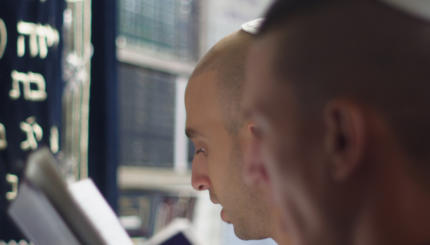The Shema prayer begins with the declaration that our experience of Jewish people peoplehood and divinity is the universal source of life. It concludes with three words: Adonai eloheichem emet (The Lord, your God, is truth). Or as I like to translate it, “the Breath of Life is our Source.”
Whatever name we use to express the ineffable mystery — life itself, the source of consciousness, the divine, God, Shechinah — is where truth can be found. Truth is what calls us together as a people and as humanity.
I always wanted a tune for these concluding words that matched the grandness of our collective voices at the beginning of the prayer, where we chant the composer Solomon Sulzer’s popular melody. The longing to express this truth as a mirror of the initial call of Shema inspired me to compose a melody and interpret the text on my first CD “Heart and Soul.”
You shall love your GOD
For you are a spark of the Divine
You shall love each other as yourself
You shall love the stranger
For you have drifted too
Let love for all fill your heart
When you pray: YAH Eloheichem Emet

Help us keep Jewish knowledge accessible to millions of people around the world.
Your donation to My Jewish Learning fuels endless journeys of Jewish discovery. With your help, My Jewish Learning can continue to provide nonstop opportunities for learning, connection and growth.
“I call the Universe to witness today
Life and death I set before you”
Into our hands are the blessing and the curse
Choose life and see blessings in our time
Choose life so those we love may be blessed
When you say: YAH Eloheichem Emet
There is a Midrash that tries to parse out why the text does not simply say adonai emet or eloheichem emet. Why would it not be enough to say the Eternal is our God or God is our Truth. Why have both?
The rabbis answered by giving God a monologue, which I translate as follows:
“When you were young, you needed a champion to take you out of oppression and to cross the sea, and I was in Moses your liberator. Then when you needed inspiration and leadership, I was in David, your beloved King. Then when you needed systems of justice, a sacred center and greater organization, I was in Solomon, your wise king. And when you were old and frail and vulnerable, you could find me as the Ancient of Days in the prophet Daniel. In each age, I am that I am, and I am also the divinity you need me to be in that time. I am Yah Eloheichem Emet.”
The Shema starts with a declaration that the oneness of existence is Israel’s compass, but it concludes with these words that invite us into a personal experience from which we can draw hope and faith even in the harshest of times. In this Midrash, the rabbis affirm that we have multiple access points to this unity depending on the context and the historical moment.
These words can guide each of us to the truth of our time that is the foundation and the guiding compass of love, justice, compassion and action in our lives today — and everyday.
Shawn Zevit is the lead rabbi of Mishkan Shalom in Philadelphia and a widely-known liturgist, author, singer and teacher.



